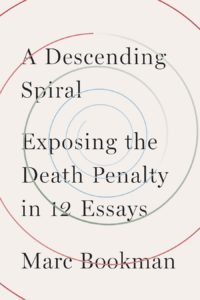It’s uncomfortable to feel entertained at the expense of those sentenced to death. It is less uncomfortable when most of this entertainment is at the expense of police, prosecuting attorneys, judges, and jurors who are corrupt, racist, and/or outrageously inept. In A Descending Spiral: Exposing the Death Penalty in 12 Essays, Marc Bookman provides such entertainment as he lays out the many ways the American judicial system fails to safeguard the rights of those accused of capital crimes.

Bookman does not make light of capital punishment. He is a lawyer in Philadelphia who for many years specialized in defending those charged with homicide. Bookman currently serves as the executive director of the Atlantic Center for Capital Representation, a nonprofit organization offering legal representation to those on death row. ACCR also advocates for the abolition of the death penalty. Bookman previously published many of the essays in A Descending Spiral in The Atlantic, Mother Jones, and Slate. Two of them, including the one that lends the book its title, treat the same case without breaking new ground. A better strategy would have been to combine the two.
In all 12 essays and in his conclusion, Bookman shines a spotlight on themes appearing in case after case: racism, prosecutorial misconduct, laziness, sloppiness, and capriciousness. The last is almost the hardest to comprehend. In a particularly horrible instance, a legal team in Texas sought a stay of execution while the U.S. Supreme Court considered the constitutionality of lethal injections. The team experienced computer failures and asked that the courthouse remain open a few minutes beyond closing time to accommodate them. Here’s what happened: “The presiding judge of the Texas Court of Criminal Appeals, Sharon Keller, uttered these immortal and immoral words: ‘We close at five.’ ” As a result, the state of Texas put the prisoner to death. Another man on death row in Texas, whose execution was set for a few days later, survived. Judge Keller continues to be elected to sit on the Texas Court of Criminal Appeals.
Bookman’s irreverent tone is at times at odds with the seriousness of his purpose. He skates on the edge of inappropriateness when he refers to the mentally ill as “crazy” and to alcoholics as “drunks.” Though it is clear from his larger message that Bookman intends no disrespect, his choice of words and cheeky tone needlessly complicate his relationship to the subject. In his acknowledgments, Bookman appears aware of the problem. He thanks an editor for making “sure the writing didn’t get in the way” and for reminding him that “these essays reflect a trauma well beyond the stories themselves, and that my writing had to respect it.”
Trauma there is aplenty in A Descending Spiral. As many others have documented, those receiving death sentences are disproportionately impoverished, abused, and — not coincidentally — mentally ill. They are also people of color. Bookman makes these traumas real by illustrating them in precise detail, rendering arcane points of law relevant and interesting.

For example, in his opening essay, Bookman explains the concept of “judicial override” — legal in Alabama, Missouri, and Florida — showing how one judge managed to twice ignore juries’ unanimous recommendations for life sentences in lieu of death sentences. In another essay, Bookman takes on criminal insanity, dissecting a case in which a paranoid schizophrenic murdered his family and gouged out first one, then his other eye. He ate the second. Even so, prosecutors refused to take mental illness into account as they argued the state should put the man to death.
Courts, Bookman explains, are loath to overturn judgments, even when new evidence comes to light. It did not matter, for example, that it came to light that a judge who sentenced a Jewish man to death was known to be racist and anti-Semitic. Nor does it often change the outcome when legal teams unearth details having to do with child abuse, neglect, or housing instability.
Unearthing is what legal teams do to try to get clients off death row. Bookman describes these lawyers as “archaeologists.” They sift through records, track down witnesses, re-examine evidence, dig through files, question those who have given testimony. Their purpose is to get as close as they possibly can to the moment a crime was committed. In the end, they know that the convicted person’s fate is likely out of their hands.
“Of course,” he writes, “any human endeavor is going to bring with it a degree of error, but is error really the right word for the coercion of two confessions or the arbitrariness of who gets executed or the simple meanness of a judge who closes a door knowing a man’s life depends on it being open?” And yet, they dig on.
Bookman writes about these legal skirmishes out of a desire to teach as well as to entertain. He wants readers to understand that nowhere in the American criminal code is there a law insisting that a person convicted of a capital offense must be sentenced to death. “After all, no murder, no matter how heinous, depraved, or just plain bizarre, requires it,” he writes. “Ever since the Supreme Court outlawed mandatory death sentences forty-five years ago, these decisions have been left to the prosecutors.”
Bookman notes that the use of the death penalty, even in the South, is declining. He predicts that the punishment will slowly disappear, perhaps without our awareness. His essays remind readers of the pointlessness and ridiculousness of the choice to put prisoners to death. Bookman’s pieces also underscore the intelligence and energy required to make this punishment a thing of the past.
